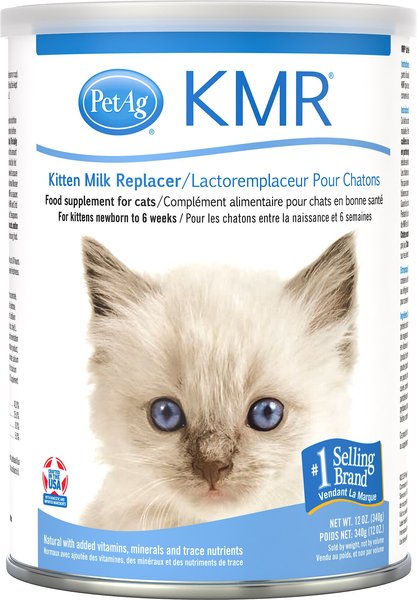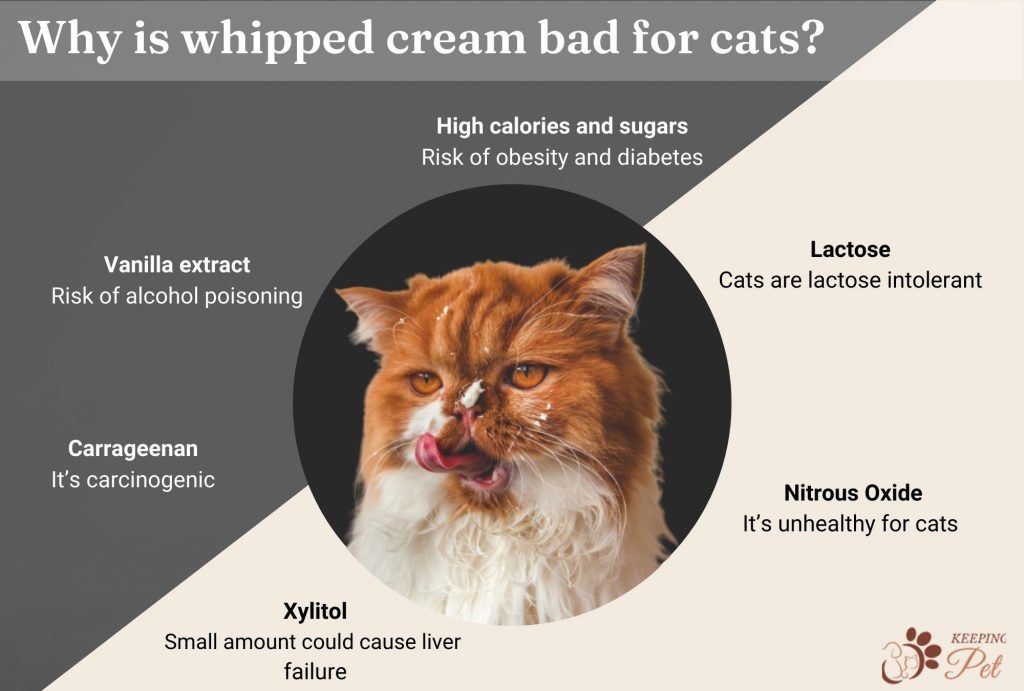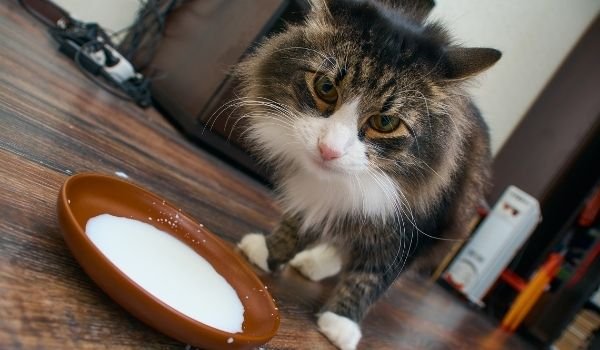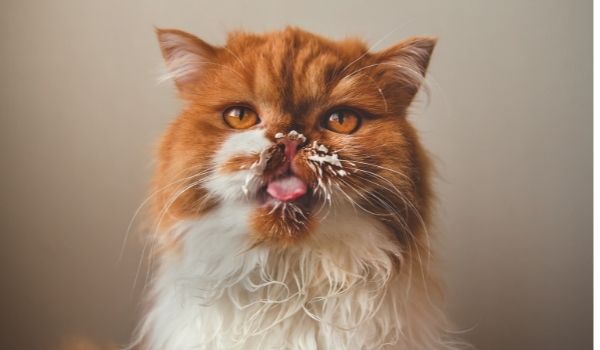Can cats have whipped cream? The short answer is no, cats should not have whipped cream. While none of the ingredients used in the making of whipped cream is inherently toxic to cats, it still makes an unhealthy snack for cats causing digestive system issues. Stick around to learn what makes whipped cream bad for cats.
Cats and Whipped Cream
Having coffee? Top it with whipped cream.
Berries? You can’t eat them without dipping them in whipped cream.
Eating banana pie, chocolate mousse, or a cake? For many, not putting whipped cream on top would be a cardinal sin.
Whipped cream is a versatile ingredient. It goes along with almost everything. It is one of the many small joys in life and fills the jubilant moments like birthdays, Valentine’s Day, anniversaries, or any celebration with joy. We want to share these special cheerful moments with our loved ones, including our feline friends.
But when our cats dive into the mountain of whipped cream on top of a chocolate cake at a birthday event, we get stressed, not about the fact that the cat has destroyed the cake, but thinking, is whipped cream bad for cats? Can cats have whipped cream? And of course, if it’s a chocolate cake, you start panicking as we know that chocolate is toxic to cats.
Can Cats have Whipped Cream?
No, cats cannot have whipped cream because it is made of ingredients that are unhealthy for cats. It is mainly made of dairy products and is also loaded with sugar and vanilla extract. All of these ingredients are unhealthy and toxic for cats and can cause tummy trouble.
Busting the Myth Around Cats and Dairy
Growing up, we all thought dairy milk and cats were a perfect fit. If you have watched the famous Tom and Jerry TV show, you will know exactly what we are talking about. With that mindset, one would think that there is nothing in this world that our cats would appreciate more than a bowl of whipped cream, but it is not the case.
Cow milk and other dairy milk products, including whipped cream, are not healthy for cats. Actually, unlike humans, most cats do not have lactase—the enzyme responsible for breaking down lactose sugar. So, ingesting anything containing lactose sugar would upset their stomach.
If you have to feed a baby kitten whose mother cat is not around, you should never give her dairy milk or even almond milk that is safe for adult cats. You should give her only kitten milk replacer.
PetAg KMR Powder Milk Supplement for Kittens

|
If you do not know how much to feed a kitten, take a look at our Kitten Feeding Chart and track her growth and development by taking a look at the Kitten Growth Chart.
Why is Whipped Cream Bad for Cats?
Whipped cream is bad for cats as all of its ingredients—dairy, sugar, vanilla extract, xylitol, carrageenan, and nitrous oxide—are deemed unhealthy for cats.
1. Lactose—Cats are Lactose Intolerant
As discussed above, cats are lactose intolerant. They lack the necessary enzymes to break down the lactose sugar present in cow milk. Therefore, we are advised never to share cow milk or any other dairy product with cats as it would upset their stomach and cause other health issues.
Signs of Lactose Intolerance in Cats
- Vomiting
- Diarrheadehydration
- Bloating
- Excessive gas
- Abdominal discomfort
If your cat seems to have developed a penchant for milk, you can give your cat some almond milk—it is safe for cats. But as with other human foods for cats, you should only give it to them in moderation.
2. High Sugar And Caloric Content—Increased Risk of Obesity
Besides the lactose sugar upsetting our cats’ stomachs, the overall excessive sugar and caloric content in whipped cream would increase the chances of our cats growing obese. Instead of expelling this useless sugar from their body, cats store it in the form of fats.
Excessive consumption of sugars may also lead to the development of diabetes and pancreatic issues in cats. Cat eating whipped cream experiences an immediate spike in sugar levels, which could be deadly for diabetic cats.
Cats are Sweet-Blind
Our cats lack the buds to appreciate the sweet taste of the whipped cream. So, if you are trying to share the glamorous sweet taste of whipped cream with your feline friend, you should not, as they just cannot appreciate the sweet taste of anything.
3. Vanilla Extract—Alcohol Poisoning in Cats
Vanilla extract is bad for cats as it contains more than 34% ethyl alcohol, which could cause alcohol poisoning in cats. Cats should be kept away from alcohol and products containing alcohol as it could also cause liver toxicity in cats.
Signs of Alcohol Poisoning in Cats
- Slowed reflexes
- Slowed breathing
- Slowed heart rate
- Heart attack Low body temperature
- Depression or excitement
- Depressed central nervous system
- Involuntary urinating or defecating
4. Xylitol—Risk of Poisoning
Many whipped cream manufacturers often use artificial sweeteners like xylitol, which could be dangerous for our cats. Though xylitol is toxic to dogs, it is not essentially deemed toxic to cats, but still, if consumed in excess, it can lead to xylitol poisoning in cats.
Signs of Xylitol Poisoning in Cats
- Vomiting
- Trembling
- Seizures
- Weakness
- Liver damage
- Low blood sugar level
5. Carrageenan—It’s Carcinogenic
Carrageenan is a food additive that is often used in foods for thickening, emulsifying, and preserving purposes. While degraded carrageenan has been classified as carcinogenic, graded carrageenan is also a cause of concern for many. Because of its carcinogenicity, the use of carrageenan has been phased out from pet foods, but it is still being used in many human foods. Many of the whipped creams available in the market contain carrageenan, giving you another reason to keep whip cream away from your cats.
Carrageenan could cause liver and colon inflammation in cats. Though there is no strong evidence to support this, it is best to keep cats away from whipped cream as much as possible; it has no real benefit to offer to our feline friends.
6. Nitrous Oxide—It’s Unhealthy for Cats
Premade whipped creams that come in containers use nitrous oxide (laughing gas) as a propellent and preservative. While there is very little chance that your cat will experience any side effects of nitrous oxide by consuming whipped cream, you should know that it is not a natural ingredient for cats and could cause health issues.
There is no research to prove the negative effects of nitrous oxide on cats, but given that too much nitrous oxide causes dizziness and impaired coordination in humans, it is reasonable to assume that it would have a worse effect on cats. So, keep whipped cream in secured kitchen cabinets, where your cat does not have access.
Can Cats Have Non-Dairy Whipped Cream?
No, cats cannot have non-dairy whipped cream. It is no better than the dairy whipped cream. No doubt, using almond milk instead of cow milk would make it lactose-free, but it will still contain vanilla extract and high sugar content—it will still be unhealthy for cats.
This indicates that even if your cat is not lactose intolerant, you should still not share whipped cream with her since it would still contain vanilla extract and high sugar content, which are bad for all cats, regardless of their lactose intolerance status.
Is Puppuccino for Cats a thing?
Puppuccino is a cup full of whipped cream that you can get from Starbucks. It is the only thing on Starbucks’ dog-friendly manual; it is loved by puppies—perhaps you have watched videos of puppies devouring cups of puppuccino. You might be wondering: If it is safe for dogs, can their feline counterparts eat it too?
Well, puppuccino is nothing different from whipped cream. While cats can have an occasional lick or two of puppuccino, we advise against offering puppuccino to cats. Instead, when making a coffee run with your cat, you can get her some safe and healthy treats like dried chicken.
What Happens if Your Cat Has Consumed Whipped Cream?
Cats are sneaky little mischievous creatures. No matter how careful you are, they will find a way to sneak up on the thing that you have been trying to keep away from them.
You just whipped a bowl full of cream on the kitchen table. You turned to put the mixer away. As you turn back, you notice that your cat is sitting on the kitchen table, and whipped cream is all over her face. She is not even guilty. You must be panicking.
Don’t panic. Cat having a lick or two of the whipped cream is not the end of the world. No doubt, this will upset your cat’s stomach—more gas than usual—but nothing beyond that. She might not even need a run down to a vet clinic.
However, if your cat’s stomach is a bit extra sensitive, there might be some vomiting and diarrhea. This would stop after an hour or two, but if it continues beyond that, you should contact your vet to inquire what you could do to make her feel better and if you need to bring her in for a checkup.
Caution!
If your cat has eaten whipped cream in excess, you should not wait for her to exhibit the symptoms. Instead, you should immediately take her to the vet for an emergency checkup.
Final Verdict: Can Cats Have Whipped Cream?
No, cats cannot have whipped cream.
There is nothing good for cats in whipped cream. Most cats are lactose intolerant, and whipped cream is loaded with lactose. It is caloric dense and has lots of sugar, increasing the risk of diabetes, obesity, and pancreatitis in cats. Where vanilla extract would cause alcohol poisoning, xylitol is highly toxic and could cause liver failure. On top of all this, premade whip creams often feature carrageenan, which is carcinogenic.
Find out what other foods cats can eat or not eat:



